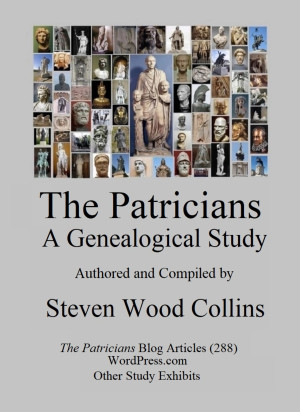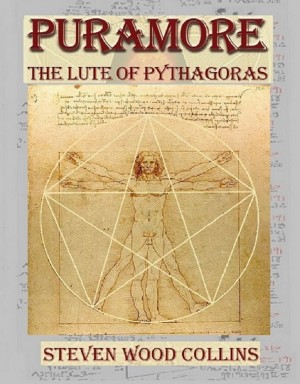Interview with Steven Wood Collins
Published 2014-05-16.
When you're not writing, how do you spend your time?
My wife and I especially enjoy world travel.
I'm also heavily involved with my genealogical research which is geared to present a different version of history. Hopefully, I'll conclude most of the basic research this year so I can begin writing the manuscript. You can view quite a bit I've uncovered so far on "The Patricians" section of my Goodreads Authors Blog (see https://www.goodreads.com/author_blog_posts/2270675-the-patricians-the-ancestral-heritage-of-steven-wood-collins-2014-ret).
How do you discover the ebooks you read?
I don't really have the time to do too much recreational reading, but Goodreads provides useful links to ebooks, as does Smashwords.
Do you remember the first story you ever wrote?
Of course, like I remember the Alamo.
What is your writing process?
Usually, I adopt a daily routine of writing something, whether as applied to my blog or any new manuscript I'm working on. Moreover, I take a "sketch and paint" approach with the fiction I write. What that means is I develop plot and sub-plots first, and then go back to add literary color, such as characterisation and setting.
Do you remember the first story you ever read, and the impact it had on you?
As I recall, I started reading Ian Fleming's "James Bond" series when I was in my early teens, although I can't for the life of me remember which one I read first. Ian's literary style and genre had a huge impact on me then.
How do you approach cover design?
I try not to produce anything that's too slick. I prefer the cover design leads the reader's eye to pique enough interest in the story so he or she will at least open the book and take a peek at the interior content.
What are your five favorite books, and why?
I'm a avid fan of historical fiction, particularly Ken Follett's novels. So, all the books of his that I've read would be included in the top five list. You could add "A Rage to Live" to the list, as well.
What do you read for pleasure?
Mainly for intellectual stimulation. I used to be a ravenous reader of NYT best sellers, but when I began writing myself, I got out of the habit.
What is your e-reading device of choice?
PC software.
What book marketing techniques have been most effective for you?
I've yet to hit upon one that I'd say has been most effective.
Describe your desk
It's quite well-organised and inspirational.
Where did you grow up, and how did this influence your writing?
I spent my childhood as an Air Force brat, so I grew up in a succession of places where my father was posted, usually a different one every six months to a year. When he left the service when I was 10, I lived mainly in Colorado Springs throughout the remainder of my youth. I'm afraid the nomadic military lifestyle left me somewhat prone to isolationism, especially since I never bonded with any one community as a result. I think the flip side of that coin of circumstance is I'm independent and rather open-minded, which leads me to some fiction of no small consequence.
When did you first start writing?
I began writing business prose in my twenties. I traveled and wrote as a publlsher's rep. last employed by Conde Nast,for about 10 years after I left college. I then entered the financial services arena, where after a stint as a stock broker and trader in the late 1980s, I took a job in a compliance-related department wherein my main tasks involved, you guessed it, writing business prose.
What's the story behind your latest book?
Well, the short answer is the fictional history of a power talisman endowed to humanity by an ancient extra-terrestrial civilisation, It is first given to an ice age shaman who's charged with its stewardship for the rest of human history. He loans the talisman to qualified individuals who thereafter wield it to ward off mankind's extinction during certain perilous periods of time. A good historical example would be the Sword of Solomon or King Arthur's Excalibre (though neither figure into my story). The talisman takes on a shape chosen by the wielder, e.g. sword, staff, cigar, etc. In my story, the talisman's power ends after 13 tries, so our protagonist, if chosen, will be the last wielder before the impending Apocalyse. .
What motivated you to become an indie author?
No liteary agent representation.
What do your fans mean to you?
The distinct honour of their seeing something worthwhile in my writing.
What are you working on next?
Perhaps a sequel to "Puramore - The Lute of Pythagoras". I have a few plays in mind, though.
Who are your favorite authors?
Ken Follett and William Shake-speare (a.k.a. Earl Edward de Vere).
What inspires you to get out of bed each day?
My blog.
How has Smashwords contributed to your success?
Yet to be determined.
What is the greatest joy of writing for you?
The total absorption of creativity.
What makes you think you have the background to pursue a career as a writer?
Firstly, I was paid to write during my career in business. That's all I basically did for the last 10 years before my fiftieth birthday. In the main, then, I wrote business prose, sometimes of a fictional nature, and not, for instance, computer code of a transitional nature.
Secondly, my ancestral background in literature tends to support my proclivity as a writer. You can judge for yourself by viewing the list of noted authors, poets, and publishers shown at the following link: https://www.goodreads.com/author_blog_posts/4666166-the-patricians-57-historically-noted-poets-authors-playwrights-and-pu
What concerns do you have about achieving success as a writer?
To tell you the truth, it won't hurt my literary sensibilities if I never realise commercial success as writer, poet, or novelist, What would hurt my feelings as a human being, though, is a malevolent threat to freedom of speech ever presented itself to thwart the exercise of creative writing pursuits by individuals like myself. If that ever occurs on a global basis, it'll spell the end of our civilisation.
Do you perceive such a threat looming on the horizon?
It's not only looming, it's here in full regalia. Some people see the internet as the "salutary" realisation of Marshall MacLuhan's "Global Village", I see it quite differently in that the trappings of Aldous Huxley's "Brave New World" society are instead beginning to show, As a "gathering of the people..." phenomenon, the internet "Global Village" gives me pause to consider its potential spiritual ramifications. I more than tangentially deal with that issue in my novel.
On the face of it, "Puramore - The Lute of Pythagoras" appears to belong to somewhat sardonic genre of literature. Is that an accurate assessment?
I think that's not necessarily inaccurate assessment. If we consider the "Creators" - such as those of Olympians, Christian, Hindi, or Judean - we might conclude that they had a sardonic sense of humour in creating mankind, or their version thereof, in their image. I don't necessarily believe the "Gods" are wagering as to how we're going to behave in terms of their laws, but if they are placing bets in the Heavenly Casino, they must be having a good time.
Smashwords Interviews are created by the profiled author or publisher.
Books by This Author
The Patricians - A Genealogical Study
by Steven Wood Collins
A valuable reference guide for both professional and amateur genealogists as well as historians.
Representing the compilation of over a decade of genealogical research and related WordPress blog articles, written and compiled as "The Patricians".


